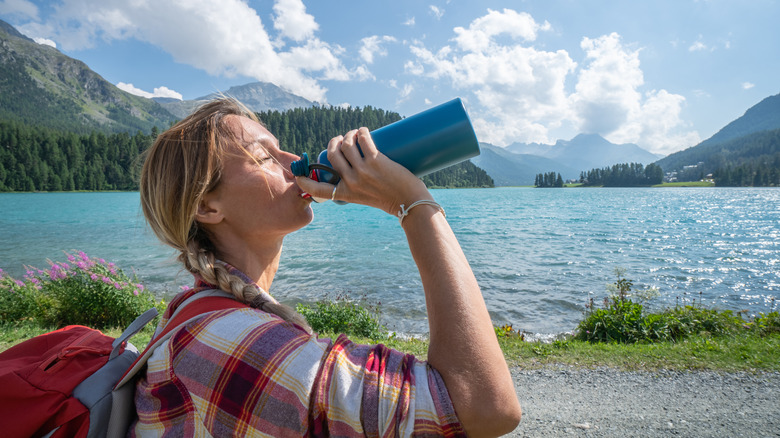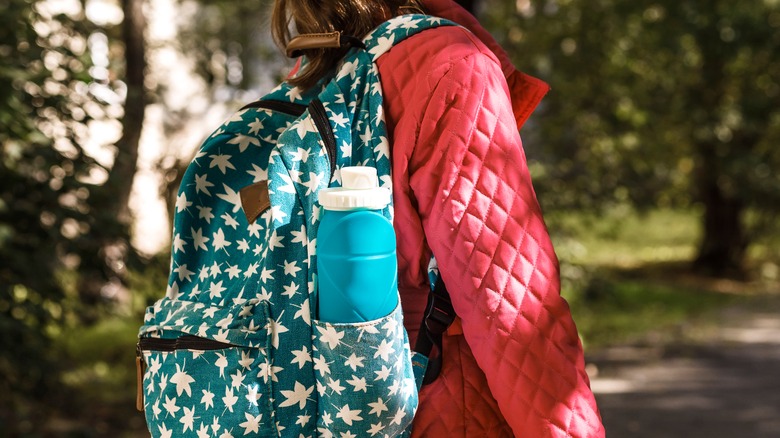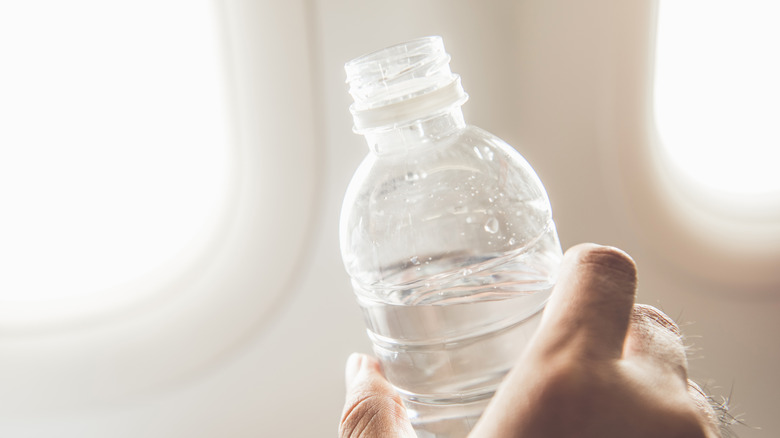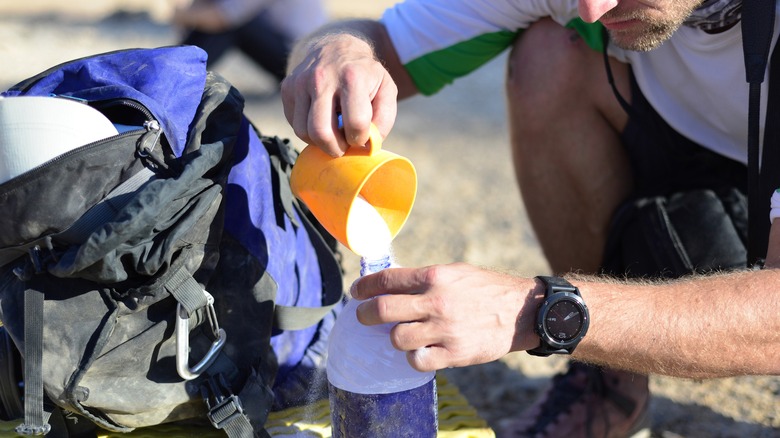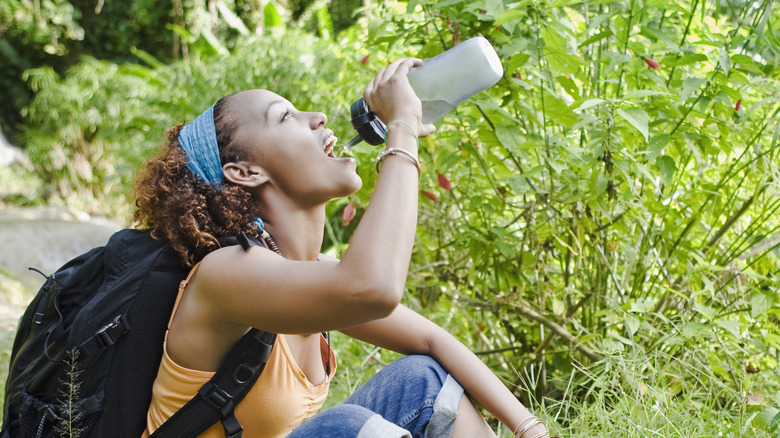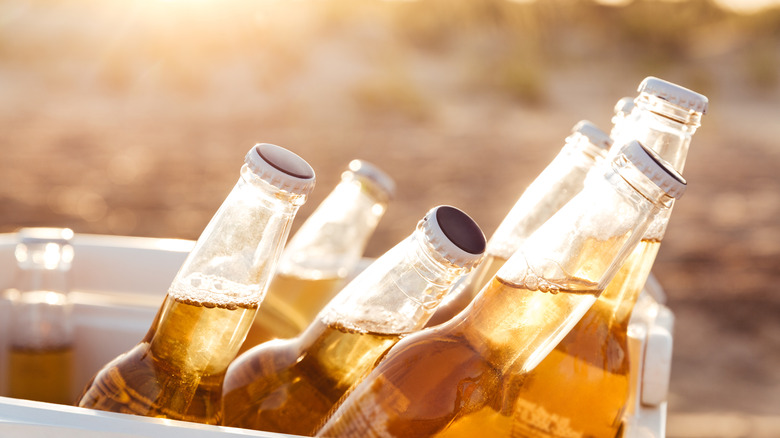Stay Hydrated On A Hike With TikTok's Clever Tips
Hiking is a wonderful way to explore a region, immerse in nature, and work up a good sweat. Whether you're a casual day hiker planning to trek a 2-mile loop or plotting multiday routes on long-distance hiking trails through the backcountry, staying hydrating may be the most important consideration when hiking.
Although an enjoyable activity, hiking can also be strenuous; and if you're hiking through the wilderness, then you'll be responsible for staying safe while on the trails. We inherently know we're supposed to drink plenty of water, yet we tend to stay a bit dehydrated in our day-to-day lives. But when hiking, dehydration can seriously impact the enjoyment of your experience — or worse, lead to a medical emergency.
Fortunately, there are easy ways to help ensure you stay hydrated on the trails, and a few TikTok users recently shared some tips worth remembering. Before lacing up your boots, consider these simple tips for staying hydrated, energized, and safe when hiking.
Keep your water easily accessible
While this tip may seem a bit obvious, you may subconsciously be more apt to grab a drink of water when it's effortless to do so. Once you hit a good hiking pace while navigating the trail and admiring the sights, staying hydrated may take a backseat in your priorities. If your water is tucked away inside your bag, you may be hesitant to stop your hiking group to fumble around for it.
When hiking, you should keep your water bottle on the outside of your bag, where it's easily accessible, or invest in a hydration pack, which allows you to hydrate without losing stride. That said, on TikTok, two hikers proposed an inventive idea that makes a packed water bottle even more accessible.
Even if your water bottle is stored in an outside pocket, you may still need to reach behind you or take off your pack to access it. Instead, the TikTokers suggest storing your water bottle in the outside pocket of another hiker's pack and vice versa. By doing so, you can grab your water bottle from their bag without losing a step.
Hydrate before your hiking adventure
As stated previously, we tend to stay pretty dehydrated in our day-to-day lives. If you're traveling somewhere to hike, then we should mention that traveling — especially flying — can further dehydrate you. Going into a hike dehydrated is the last thing you want to do, so we recommend consciously hydrating before your hike.
On TikTok, one hiker recommends hydrating for three days before your hiking adventure. And, given our habit of staying a bit dehydrated anyway, this seems like solid advice. While you'll definitely want to take an ample amount of water for the hike's duration, you may be able to shed extra weight by ensuring you're hydrated before leaving the trailhead.
Following the metric system, one liter of water weighs one kilogram. In other words, water is heavy, and weight is something to minimize on a hike. Again, you don't want to skimp, but starting your hike hydrated may allow you to trim down the weight of your water reservoir.
Add electrolytes to your drinking water
While we don't want to line up against Adam Sandler in "The Waterboy," your H20 could probably use an upgrade if the hike is particularly intense. There are a lot of misconceptions concerning electrolytes, as many associate electrolytes with sugary sports drinks. However, electrolytes actually help you stay hydrated while balancing your blood acidity and regulating your muscle function. Sugar only helps the absorption of electrolytes, and it doesn't take much of the sweet stuff to do so. In other words, adding a kick of electrolytes to your water doesn't necessarily mean adding a bunch of sugar.
You can either purchase an electrolyte powder or electrolyte drops to add to your water bottle or create your own electrolyte recipe. While you can find a number of TikTok videos that share electrolyte recipes, a simple one requires only lemon juice, a dash of salt, and a touch of sugar or honey. But when weight is a consideration, you're probably better off simply packing a powder or drop solution than juggling lemons on the trail.
Take smaller sips before you're thirsty
The amount of water you'll need while hiking depends on a lot of factors, including your body type, the weather, the length of the hike, the hike's intensity, and your sweat rate. However, according to REI, you generally require around one-half liter of water for every hour of moderate activity. If the temperature rises or the hike's intensity ramps up, then you may require more.
Given these guidelines, you'll be much better off taking sips of water every half hour versus chugging a liter of water every two hours. When your body compels you to chug a bunch of water (or you're just thirsty in general), you're already dehydrated — a risky situation when hiking.
Also, if you're someone who gets fully immersed in the hiking experience, whether it's due to taking in the sights or hiking in a more meditative manner, then it may be wise to set a timer to help you regulate your hydration.
Be mindful about what dehydrates you
While sweating from exertion will be the main culprit of dehydration, there are other factors that can contribute. As mentioned earlier, you should drink lots of water while flying due to the dry air at high elevations. Also, sunburns can seriously dehydrate you, so you'll need to make sure you wear sunscreen while hiking. Alcohol is also a common reason that hikers find themselves dehydrated while on the trails.
If you're planning to hike, you may want to skip the booze the night before. Alcohol is a diuretic, which means that alcohol quickly removes fluids from your blood, leading to dehydration. If you do drink a few beers during the downtime of a camping and hiking excursion, then it's important to also drink plenty of water. Being hungover on your couch is one thing, but a dehydration-driven hangover on the trails is another monster entirely.
Stay smart, lace up hydrated, and drink plenty of water on the trails. With a little planning and mindfulness, you can enhance the enjoyment and help ensure the safety of your next hiking adventure.
